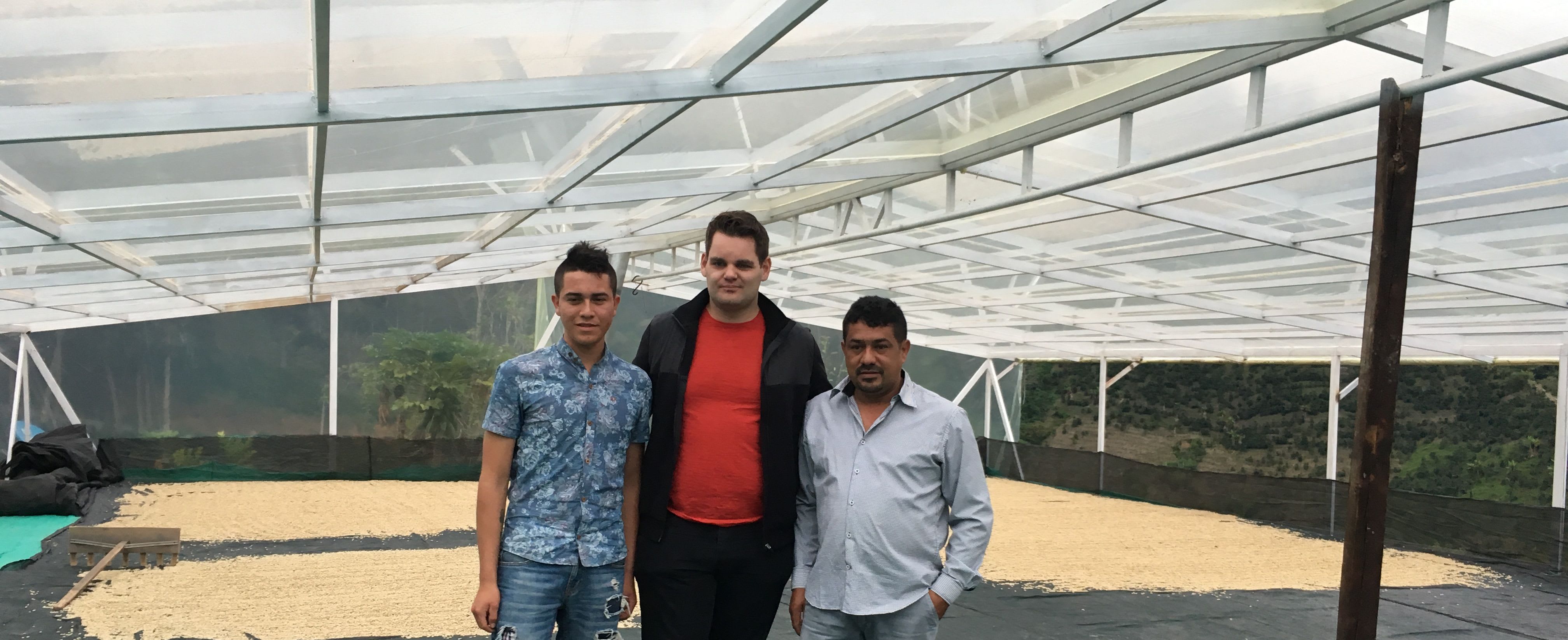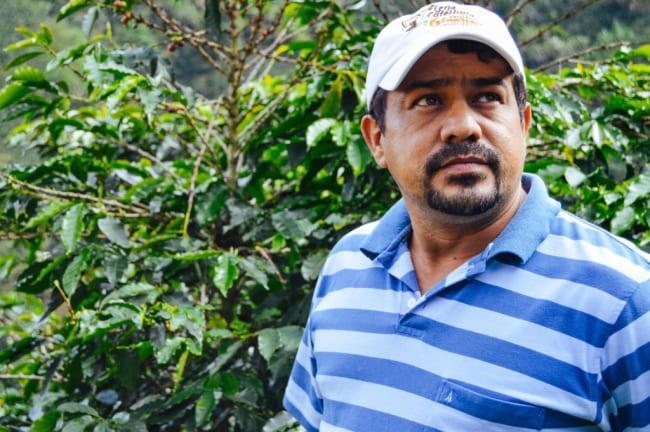This is the fifth year we’ve had El Cairo on our menu – so it’s been around almost since the beginning! A Colombian burst of orange and mandarin flavours, it’s a delicious variety grown by Faiber Vega Salazar. Today his farm is thriving, but it wasn’t always that way…
Year 1
El Cairo was actually one of the first farms Pact Coffee started a Direct Trade relationship with. Back in 2014, Head of Coffee Will headed over to Colombia to find new partners and stumbled across one particular farm.
The farmhouse was open to the elements with a mud floor, and just two walls making up the kitchen-cum-living room. The roof was made of wooden floorboards with large holes dotted here and there, so rain came in throughout the house – and in the Huila region, rainy seasons come hard and often. With three generations living in this home, coffee farming was a life that was no longer appealing.
But despite the unthinkable living conditions, the coffee they produced was of a good quality. So Will decided to buy some, bringing it back in a container with coffee from other farms like Casa Loma. He knew they needed our help – not to improve the coffee, but to improve their quality of life.
Year 2
Coming back the next year, things had changed. Using the money from the coffee sale in the first year, Faiber worked with us to make some vital improvements to his building. As his gap-filled roof had also doubled as a drying bed, requiring a rudimentary system of sweeping the coffee under a tarp when it rained, this is where we started.
Work was done to construct a stainless steel frame to sit above the house, covered with a clear tarpaulin – so his coffee was always protected from the elements. The roof itself was replaced too, so the house actually had its own waterproof barrier, and the mud floors were covered with concrete. Basic improvements, but ones that were essential to make life bearable on the El Cairo farm.
From the fixes they made using money from the first trip, they could grow even more coffee for us to buy – meaning Faiber could pay off the debts he owed to unscrupulous people who so often take advantage of impoverished coffee farmers. Cash in the bank meant the farm and Faiber’s family were safe, and life was a lot happier.
Year 3
The next year we visited, there was more to be done. Living conditions had been sorted and coffee processes had been touched on, but it was time to get serious.
We began a project that involved paying them extra to rebuild their washing station. The existing one was right next to where he had been keeping his pigs (or “porks” as he called them, an arguably more accurate mistranslation!) – which is not ideal, considering the wafting smells of manure travelling over to the fresh coffee.
With our help, Faibre moved the pigs and rebuilt the fermentation area. He even built a lift from there to the drying beds on his rooftop, so he could more easily move coffee to be dried. A big improvement from lugging it all on his back!
All of those improvements meant the coffee, and life, just kept getting better on the El Cairo farm.
Year 4
Coming back the next year, Will got some great news. As we’ve talked about before, there is a real problem with the children of farming families leaving the industry for the promise of something more. Growing up in miserable living conditions, financial insecurity and threats from debtors is not a big draw.
Kids from coffee farms often look to city living as a way out. A stable 9-5 job, a steady income, a more modern home – you can’t really blame them for finding that appealing. But this is a problem for the coffee industry, because someone needs to carry on the trade.
Faibre’s son was fast on his way to becoming one of these disenfranchised youths, when Will first met the family. But after experiencing a better quality of life, a buyer relationship that has shown the family respect, and hard evidence that coffee that be profitable, he told Will he was planning to remain on the farm.
For us, that’s a big win. Why not celebrate with us, by raising a mug of the ever-delicious El Cairo?







